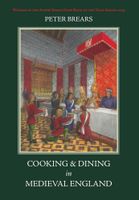Advertisement
Table Manners
Appears in
By Peter Brears
Published 2008
Manners were one of the most important indicators of status and education in medieval England, and so were carefully formulated, taught and observed across most levels of society. This chapter will deal with those of ordinary people, who took their everyday meals in the hall.
The word ‘hall’ today conjures up a huge banqueting-room hung with brilliant textiles, heated by roaring log fires, lit by hundreds of candles, and inhabited by silk- and velvet-clad lords and ladies dining off great gold and silver chargers. Such images, promoted in the works of film-makers and those who publish guides to ancient monuments, are almost entirely fictitious. In reality, the hall had already become a servants’ hall in most fourteenth-century great households; in farmhouses it was where the farm servants fed; and in cottages it was the single kitchen-living-room in which all domestic activities took place, often with cattle and hens under the same narrow roof.

